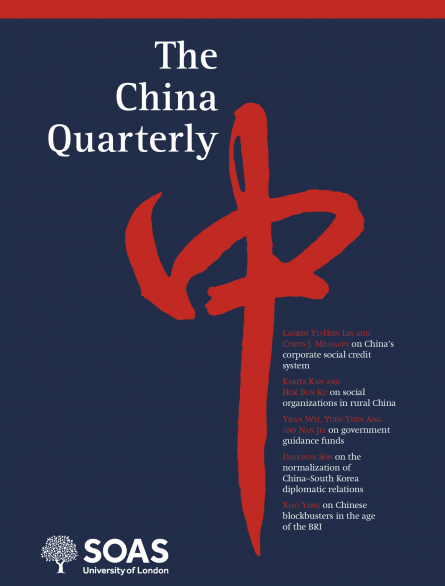
Dr. Armin Müller, postdoctoral researcher in the project B05: "Inclusion and Benefit Dynamics in the Chinese Welfare Regime", wrote an article for "The China Quarterly" published online by Cambridge University Press.
The article "Cooperation Between Colleges and Companies: Vocational Education, Skill Mismatches and China's Turnover Problem" analyzes how market failure in skill formation is tackled in China from a collective action perspective. The state intervenes by providing vocational education in public middle schools and colleges, trying to provide companies with the skilled labor they need. However, much like in the Italian system, weak bureaucracy undermines the implementation of state regulation and the effective creation of vocational skills. Therefore, under the surface, skill formation is still dominated by market dynamics, and hence market failure. The article focuses on the role of collaborative projects between vocational colleges and private companies in mediating the dynamics of market failure. While such projects somewhat decrease the skill mismatches in the labor market, they are voluntary negotiated agreements that cannot tackle the underlying redistributive problems between companies and workers. Overall, the status quo drives the polarization of skills in the long run, thus reinforcing economic inequality.
Abstract
The Chinese government promotes cooperation between colleges and companies in vocational education to improve the supply of skilled workers and increase labour productivity. This study employs the concept of positive coordination – negotiations concurrently addressing productive and distributive questions – to analyse the advantages and limitations of voluntary cooperation embedded in networks. In terms of production, many projects focus on updating, narrowing and deepening curricula to lower the costs of initial training borne by companies and the risk of labour turnover. In terms of distribution, however, the deep and narrow curricula are at odds with students’ preference for general and transferable skills; and the mutual commitments of both companies and students are uncertain. The solutions provided by cooperation are partial and unstable. Overall, they reduce skill mismatches but cannot control turnover or overcome market failure, which undermines tertiary vocational education's contribution to labour productivity.
Armin Müller is a postdoctoral researcher at Constructor University, Bremen, Germany, and member of the project "Inclusion and Benefit Dynamics in the Chinese Welfare Regime" at the Collaborative Research Centre 1342 "Global Dynamics of Social Policy" funded by the German Research Foundation (DFG). He formerly worked at Georg-August University Göttingen, Germany. His research focuses on social protection and the healthcare system in the People’s Republic of China, as well as vocational education and migration. He wrote his PhD about China’s rural health insurance at the University of Duisburg-Essen and spent one semester with the Transnational Studies Initiative at Harvard University studying transnational forms of social security.
Contact:
Dr. Armin Müller













